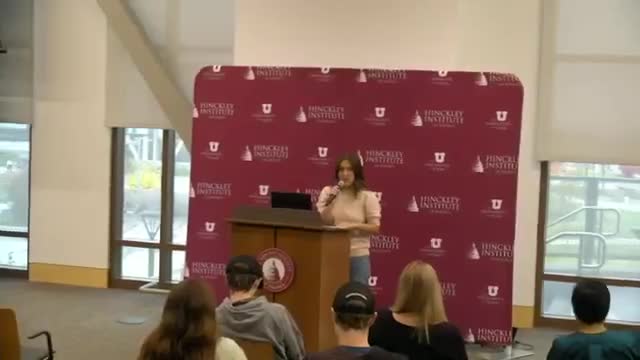Choice Humanitarian CEO urges locally led development, warns of funding risks after USAID restructuring
Get AI-powered insights, summaries, and transcripts
Subscribe
Summary
At a Hinckley Institute forum at the University of Utah, Heather Hammond Crews, CEO of Choice Humanitarian, described the nonprofit’s locally led approach to reducing global poverty, shared community success stories from Kenya, Peru and Ecuador, and answered student questions about funding, expansion and the effect of recent USAID changes.
Heather Hammond Crews, chief executive officer of Choice Humanitarian, told a University of Utah audience on Wednesday that locally led, community-driven development is the most effective path to reduce global poverty and to sustain results when international funding shifts.
Speaking at the Hinckley Institute of Politics forum “Compassion Into Action: Disrupting Global Poverty Together,” Crews said Choice Humanitarian partners with community leaders, local technical staff and donors to build projects intended to be owned and maintained by residents. “Projects should be created with communities, not for them,” she said.
The message was framed around several field examples Crews and her staff described. In a rural Kenyan community Crews identified as Piku, she said a community-driven expansion and fortification of nearby dams has provided cleaner water for “homes, schools and hospitals,” and now benefits roughly 1,300 residents. In Peru, Crews described a 77-year-old farmer who adopted a bio‑garden technique to provide food for his grandchildren. In Ecuador, she described a women’s cooperative — which Crews identified as the Mbewarmee women’s cooperative — that helped a woman named Laura develop a greenhouse and small handicrafts business after leaving an abusive relationship.
Crews repeatedly emphasized partnership and long-term capacity building. “The ultimate measure of success is when the community has the strength and resources to lead its own growth,” she said. She listed five principles of effective development: local ownership and participation; sustainability and capacity building; accountability and transparency; evidence-based, context-specific design; and coordination and partnerships.
Crews also addressed broader sector risks. She said that in 2025 the U.S. government ordered a “large scale restructuring” of foreign aid that, she said, has “effectively shut down most USAID programs worldwide,” a change she described as prompting reflection across the development field about funding models and leadership. She attributed that description of the change to how the shift has affected aid delivery and the sector’s funding environment, rather than presenting independent confirmation.
Riley Greenwood, Choice Humanitarian’s director of operations, described how the nonprofit’s field model works in practice: a small headquarters staff in Draper, Utah, supporting roughly 90 locally based technical staff in seven countries, who co-design projects with motivated local leaders and technical experts. Greenwood said Choice operates an “expeditions” program whose participant fees and other revenue streams — including individual donors, corporate partners, grants and fundraising events — contribute to the organization’s budget.
During a student question-and-answer period, participants asked how the USAID changes have affected Choice and the sector; how Choice ensures community participation and navigates cultural resistance; and how the nonprofit decides whether to expand into new countries. Crews said Choice had not recently relied on USAID funding in its country projects and so did not experience the same immediate funding disruption that some organizations faced, but she said the sector-wide shift increased uncertainty and reinforced the nonprofit’s emphasis on diversified funding and resilient, locally rooted programming.
On funding, Greenwood said Choice seeks a “healthy mix” of revenue: individual donors, corporate foundation partners, grants, expedition fees and local leverage (contributions in labor or local government support that reduce direct costs). He said the organization is “driven by where our needs are” and weighs the high startup cost and relationship-building required to enter new countries against the alternative of deepening existing programs.
Crews and Greenwood described trust building, peer-to-peer visits between communities, and culturally tailored education as core tactics for addressing local skepticism or corruption. “We try to be a pull, not a push,” Greenwood said — meaning communities invite or request support rather than having projects imposed on them.
The forum was hosted by Rory Stewart of the Hinckley Institute of Politics and included a roughly 55‑minute presentation plus questions. Crews encouraged students from all fields to consider roles in poverty reduction — from internships and volunteering to careers in business, health, engineering, policy and research — and urged ethically informed consumer and civic behavior.
A question-and-answer session followed the presentation, during which Crews and Greenwood elaborated on operations, cross‑sector partnerships with universities and businesses, and the organization’s emphasis on monitoring and sustainability. Crews closed by encouraging students to “turn compassion into action” through study, volunteering and advocacy.
